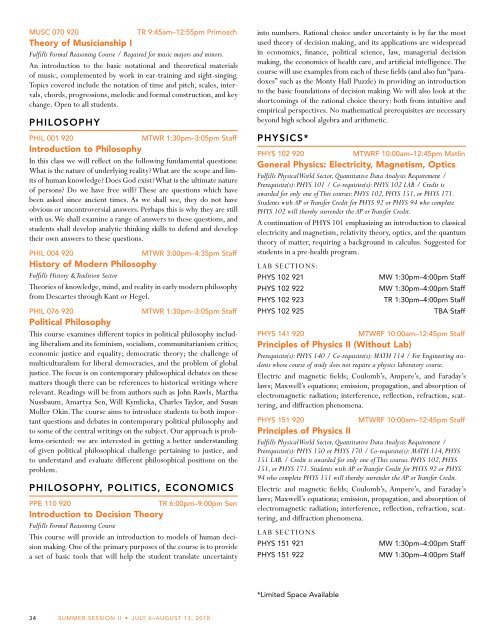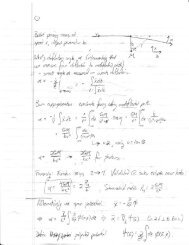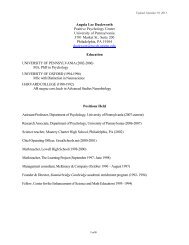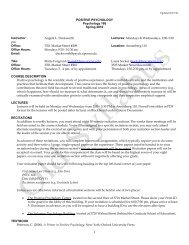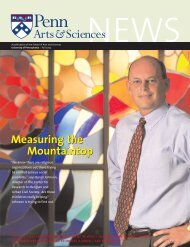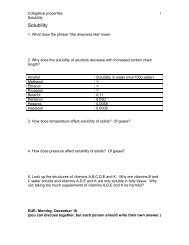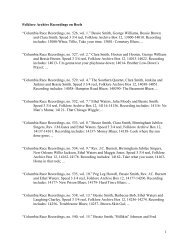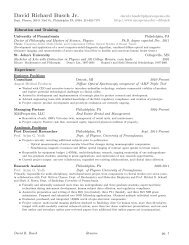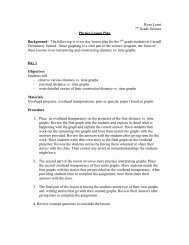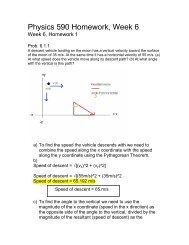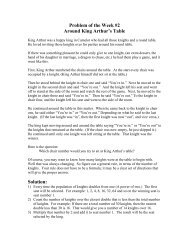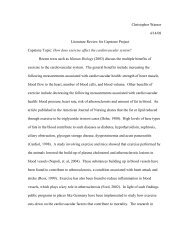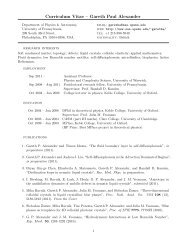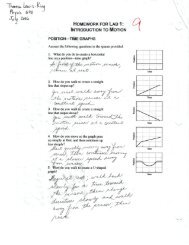PENN SUMMER - University of Pennsylvania
PENN SUMMER - University of Pennsylvania
PENN SUMMER - University of Pennsylvania
Create successful ePaper yourself
Turn your PDF publications into a flip-book with our unique Google optimized e-Paper software.
MusC 070 920 Tr 9:45am–12:55pm Primosch<br />
Theory <strong>of</strong> Musicianship I<br />
Fulfills Formal Reasoning Course / Required for music majors and minors.<br />
An introduction to the basic notational and theoretical materials<br />
<strong>of</strong> music, complemented by work in ear-training and sight-singing.<br />
Topics covered include the notation <strong>of</strong> time and pitch, scales, intervals,<br />
chords, progressions, melodic and formal construction, and key<br />
change. Open to all students.<br />
PhiloSoPhY<br />
PhIl 001 920 MTWr 1:30pm–3:05pm staff<br />
Introduction to Philosophy<br />
In this class we will reflect on the following fundamental questions:<br />
What is the nature <strong>of</strong> underlying reality? What are the scope and limits<br />
<strong>of</strong> human knowledge? Does God exist? What is the ultimate nature<br />
<strong>of</strong> persons? Do we have free will? These are questions which have<br />
been asked since ancient times. As we shall see, they do not have<br />
obvious or uncontroversial answers. Perhaps this is why they are still<br />
with us. We shall examine a range <strong>of</strong> answers to these questions, and<br />
students shall develop analytic thinking skills to defend and develop<br />
their own answers to these questions.<br />
PhIl 004 920 MTWr 3:00pm–4:35pm staff<br />
History <strong>of</strong> Modern Philosophy<br />
Fulfills History & Tradition Sector<br />
Theories <strong>of</strong> knowledge, mind, and reality in early modern philosophy<br />
from Descartes through Kant or Hegel.<br />
PhIl 076 920 MTWr 1:30pm–3:05pm staff<br />
Political Philosophy<br />
This course examines different topics in political philosophy including<br />
liberalism and its feminism, socialism, communitarianism critics;<br />
economic justice and equality; democratic theory; the challenge <strong>of</strong><br />
multiculturalism for liberal democracies, and the problem <strong>of</strong> global<br />
justice. The focus is on contemporary philosophical debates on these<br />
matters though there can be references to historical writings where<br />
relevant. Readings will be from authors such as John Rawls, Martha<br />
Nussbaum, Amartya Sen, Will Kymlicka, Charles Taylor, and Susan<br />
Moller Okin. The course aims to introduce students to both important<br />
questions and debates in contemporary political philosophy and<br />
to some <strong>of</strong> the central writings on the subject. Our approach is problems-oriented:<br />
we are interested in getting a better understanding<br />
<strong>of</strong> given political philosophical challenge pertaining to justice, and<br />
to understand and evaluate different philosophical positions on the<br />
problem.<br />
PhiloSoPhY, PoliTiCS, eConoMiCS<br />
PPe 110 920 Tr 6:00pm–9:00pm sen<br />
Introduction to Decision Theory<br />
Fulfills Formal Reasoning Course<br />
This course will provide an introduction to models <strong>of</strong> human decision<br />
making. One <strong>of</strong> the primary purposes <strong>of</strong> the course is to provide<br />
a set <strong>of</strong> basic tools that will help the student translate uncertainty<br />
34 <strong>SUMMER</strong> SESSIOn II • JULY 6–AUgUST 13, 2010<br />
into numbers. Rational choice under uncertainty is by far the most<br />
used theory <strong>of</strong> decision making, and its applications are widespread<br />
in economics, finance, political science, law, managerial decision<br />
making, the economics <strong>of</strong> health care, and artificial intelligence. The<br />
course will use examples from each <strong>of</strong> these fields (and also fun “paradoxes”<br />
such as the Monty Hall Puzzle) in providing an introduction<br />
to the basic foundations <strong>of</strong> decision making. We will also look at the<br />
shortcomings <strong>of</strong> the rational choice theory: both from intuitive and<br />
empirical perspectives. No mathematical prerequisites are necessary<br />
beyond high school algebra and arithmetic.<br />
PhYSiCS*<br />
PhYs 102 920 MTWrF 10:00am–12:45pm Matlin<br />
General Physics: Electricity, Magnetism, Optics<br />
Fulfills Physical World Sector, Quantitative Data Analysis Requirement /<br />
Prerequisite(s): PHYS 101 / Co-requisite(s): PHYS 102 LAB / Credit is<br />
awarded for only one <strong>of</strong> This courses: PHYS 102, PHYS 151, or PHYS 171.<br />
Students with AP or Transfer Credit for PHYS 92 or PHYS 94 who complete<br />
PHYS 102 will thereby surrender the AP or Transfer Credit.<br />
A continuation <strong>of</strong> PHYS 101 emphasizing an introduction to classical<br />
electricity and magnetism, relativity theory, optics, and the quantum<br />
theory <strong>of</strong> matter, requiring a background in calculus. Suggested for<br />
students in a pre-health program.<br />
lAb SectionS:<br />
PHYs 102 921 MW 1:30pm–4:00pm staff<br />
PHYs 102 922 MW 1:30pm–4:00pm staff<br />
PHYs 102 923 Tr 1:30pm–4:00pm staff<br />
PHYs 102 925 TbA staff<br />
PhYs 141 920 MTWrF 10:00am–12:45pm staff<br />
Principles <strong>of</strong> Physics II (Without Lab)<br />
Prerequisite(s): PHYS 140 / Co-requisite(s): MATH 114 / For Engineering students<br />
whose course <strong>of</strong> study does not require a physics laboratory course.<br />
Electric and magnetic fields; Coulomb’s, Ampere’s, and Faraday’s<br />
laws; Maxwell’s equations; emission, propagation, and absorption <strong>of</strong><br />
electromagnetic radiation; interference, reflection, refraction, scattering,<br />
and diffraction phenomena.<br />
PhYs 151 920 MTWrF 10:00am–12:45pm staff<br />
Principles <strong>of</strong> Physics II<br />
Fulfills Physical World Sector, Quantitative Data Analysis Requirement /<br />
Prerequisite(s): PHYS 150 or PHYS 170 / Co-requisite(s): MATH 114, PHYS<br />
151 LAB. / Credit is awarded for only one <strong>of</strong> This courses. PHYS 102, PHYS<br />
151, or PHYS 171. Students with AP or Transfer Credit for PHYS 92 or PHYS<br />
94 who complete PHYS 151 will thereby surrender the AP or Transfer Credit.<br />
Electric and magnetic fields; Coulomb’s, Ampere’s, and Faraday’s<br />
laws; Maxwell’s equations; emission, propagation, and absorption <strong>of</strong><br />
electromagnetic radiation; interference, reflection, refraction, scattering,<br />
and diffraction phenomena.<br />
lAb SectionS<br />
PHYs 151 921 MW 1:30pm–4:00pm staff<br />
PHYs 151 922 MW 1:30pm–4:00pm staff<br />
*Limited space Available


